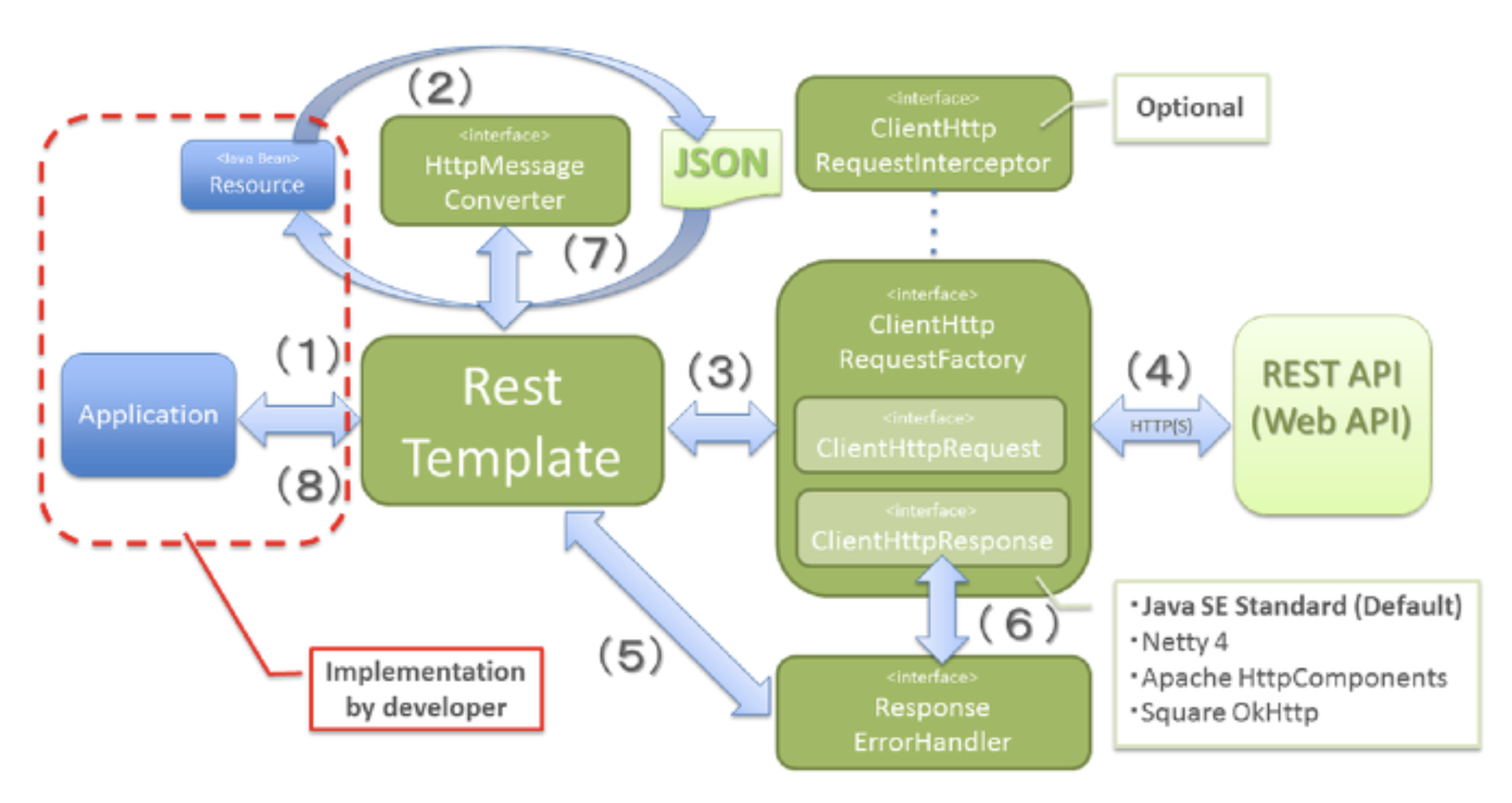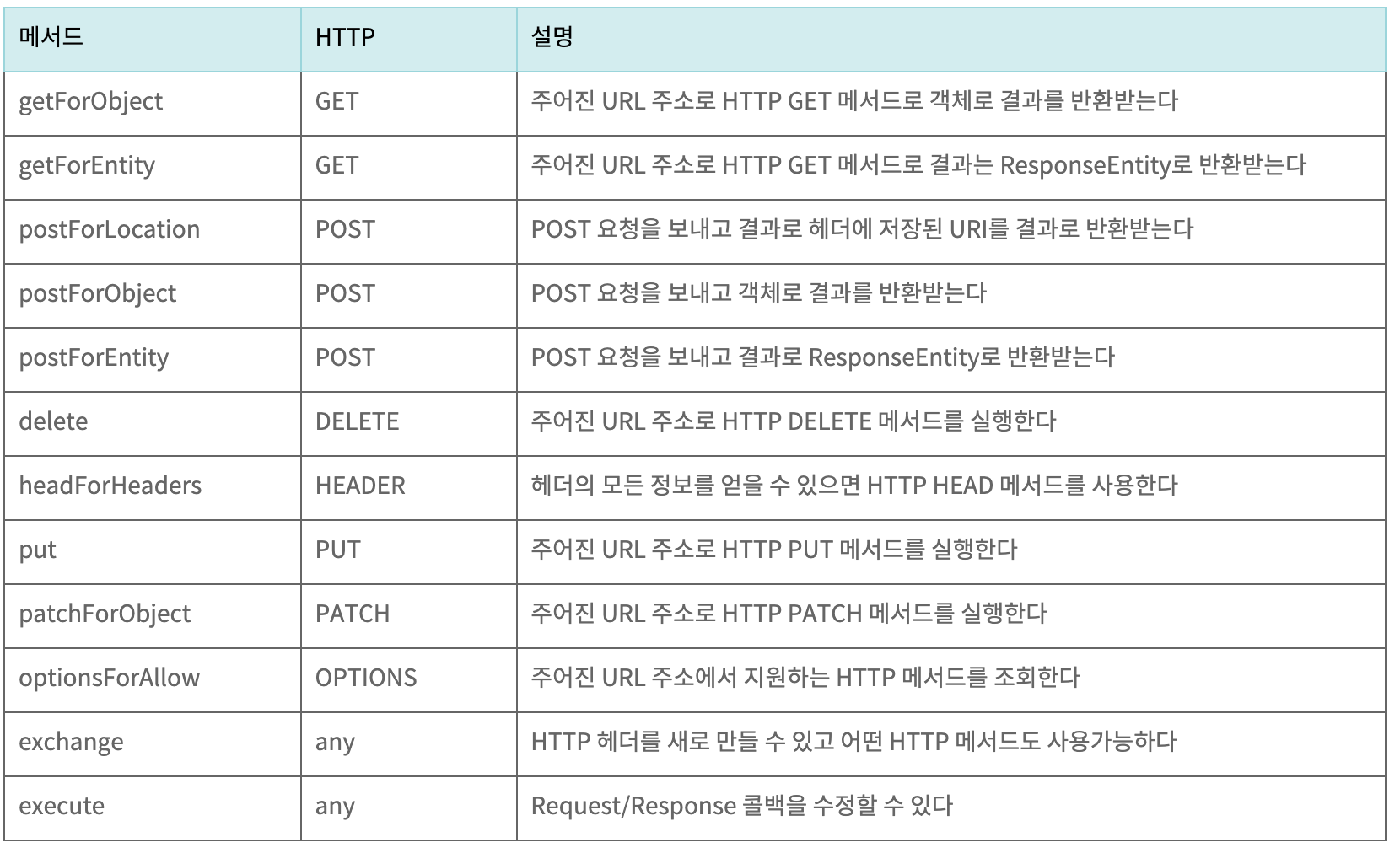RestTemplate
RestTemplate이란?
- Spring에서 제공하는 http통신에 사용하는 템플릿
- Spring3.0부터 지원
- RestAPI 호출 이후 응답을 받을 때까지 기다리는 동기 방식
RestTemplate 동작원리

- 어플리케이션이 RestTemplate를 생성하고, URI, HTTP메소드 등의 헤더를 담아 요청한다.
- RestTemplate 는 HttpMessageConverter 를 사용하여 requestEntity 를 요청메세지로 변환한다.
- RestTemplate 는 ClientHttpRequestFactory 로 부터 ClientHttpRequest 를 가져와서 요청을 보낸다.
- ClientHttpRequest 는 요청메세지를 만들어 HTTP 프로토콜을 통해 서버와 통신한다.
- RestTemplate 는 ResponseErrorHandler 로 오류를 확인하고 있다면 처리로직을 태운다.
- ResponseErrorHandler 는 오류가 있다면 ClientHttpResponse 에서 응답데이터를 가져와서 처리한다.
- RestTemplate 는 HttpMessageConverter 를 이용해서 응답메세지를 java object(Class responseType) 로 변환한다.
- 어플리케이션에 반환된다.
RestTemplate Method

1. getForObject <-> getForEntity
getForObject
RestTemplate restTemplate = new RestTemplate();
Object response = restTemplate.getForObject(uri, Object.class);getForEntity
RestTemplate restTemplate = new RestTemplate();
ResponseEntity<Object> response = restTemplate.getForObject(uri, Object.class);
System.out.println(response.getStatusCode()); // 200 ok
System.out.println(response.getHeaders());
System.out.println(response.getBody());2. postForEntity
postForEntity
UserRequest req = new UserRequest();
req.setName("steve");
req.setAge(10);
RestTemplate restTemplate = new RestTemplate();
ResponseEntity<UserResponse> response = restTemplate.postForObject(uri, req, UserResponse.class);
System.out.println(response.getStatusCode()); // 200 ok
System.out.println(response.getHeaders());
System.out.println(response.getBody());3. 헤더 지정(exchange)
UserRequest req = new UserRequest();
req.setName("steve");
req.setAge(10);
RequestEntity<UserRequest> requestEntity = RequestEntity
.post(uri)
.contentType(MediaType.APPLICATON_JSON)
.header(“x-authorization”, “abcd”)
.header(“custom-header”, “ffff”)
.body(req);
RestTemplate restTemplate = new RestTemplate();
RestponseEntity<userResponse> response = restTemplate.exchange(requestEntity, UserResponse.class);4. generic
//response class
Public class Req<T> {
private String exampleString;
private T exampleObject;
}
//restTemplate
restTemplate.exchange(requestEntity, Req<someObject>.class);-> 오류 발생 -> generic class에는 .class를 붙일 수 없다
restTemplate.exchange(requestEntity, new ParameterizedTypeReference<Req<someObject>>(){});
ResponseEntity<Req<someObject>> response = restTemplate.exchange(requestEntity, new ParameterizedTypeReference<>(){});
//responseEntity<>안에 타입을 지정해두어 ParameterizedTypeReference의 <>는 생략 가능URI
1. new URI
URI uri = new URI(str);2. URI.create(str)
URI uri = URI.create(str);
// create(str) code
public static URI create(String str) {
try {
return new URI(str);
} catch (URISyntaxException x) {
throw new IllegalArgumentException(x.getMessage(), x);
}
}생성되는 결과는 같지만 exception 처리를 해준다
3. UriComponentsBuilder
URI uri = UriComponentsBuilder
.fromUriString("http://localhost:8080")
.path("/api/server/hello")
.encode() // 인코딩 (default : UTF-8)
.build() // 인스턴스 빌드
.toUri();
// http://localhost:8080/api/server/helloqueryParam
URI uri = UriComponentsBuilder
.fromUriString("http://localhost:8080")
.path("/api/server/hello")
.queryParam("id", "testId")
.queryParam("type", "0000")
.encode()
.build()
.toUri();
// http://localhost:8080/api/server/hello?id=testId&type=0000http://localhost:8080/api/server/user/{userId}/name/{userName}
URI uri = UriComponentsBuilder
.fromUriString("http://localhost:8080")
.path("/api/server/user/{userId}/name/{userName}")
.encode()
.build()
.expand(100, "steve")
.toUri();
// http://localhost:8080/api/server/user/100/name/steve
// 주의
.expand(100)
.expand("steve")
// -> 오류 발생 : 첫 번째 expand()만 인식된다RestTemplate과 함께 사용시 주의사항
// RestTemplate + URI/String
String uri = UriComponentsBuilder...String타입의 경우 RestTemplate에서 내부적으로 인코딩을 수행
-> 인코딩 중복 수행될 수 있다
-> RestTemplate과 함께 사용한다면 URI로 생성하거나 인코딩 되지 않은 String을 생성하여 사용
기타
restTemplate.getForObject(uri, String.class)
-> restTemplate을 통해 response를 string으로 변환시 한글 깨짐 현상 발생
HttpMessageConverter : HTTP request / response를 변환
StringHttpMessageConverter : Http response를 String으로 변환
-> default Charset : ISO-8859-1
template.getMessageConverters()
.add(0, new StringHttpMessageConverter(Charset.forName("UTF-8")));-> 한글 깨짐 현상 해결
